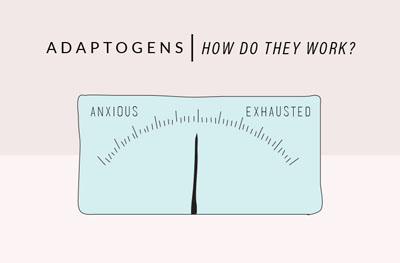“Adaptogens are meant to bring us back to the middle” says Dr. Brenda Powell, co-medical director of the Center for Integrative and Lifestyle Medicine at the Cleveland Clinic’s Wellness Institute.1
Functional medicine guru Frank Lipman, MD,2 calls them: “Nature’s miracle anti-stress and fatigue fighters.”
Chances are if you’ve been a bit of a “stress-head” then you’ve heard of adaptogens over the last 3-5 years. Adaptogens are like a bestie (aka best friend).They don’t seem to necessarily have one specific function or action but instead they help us to respond to any influence or stressor, helping us adapt and normalizing our physiological responses or functions.
Ric Scalzo, the CEO and founder of GaiaHerbs says that,
 “To be an adaptogen, herbs have to be non-toxic to the body’s physiological functions, offer widespread support, and help bring the body back to equilibrium.”3
“To be an adaptogen, herbs have to be non-toxic to the body’s physiological functions, offer widespread support, and help bring the body back to equilibrium.”3
Photo credit: pinterest of Ric Scalzo
We all know that stress is a risk factor for a number of diseases and is an important predictor of health in general. Stress can impact our sleep, our metabolism, our energy, our relationships. Adaptogens have been used for centuries in Chinese and Ayurvedic healing traditions to help the body adapt to stress.
Adaptogens include:
Ashwaganda, Astragalus, Ginseng (Asian and Siberian), Licorice root, Holy basil, some mushrooms (Reishi, Lions Mane) and Rhodiola, Milk Thistle, Rosemary, Aloe Vera, Gotu Kola, Maca, Moringa Oleifera, Schisandra, Bacopa.
Adaptogens come in lots of different forms – vitamins, supplements, tinctures that can be mixed with water; powders, which you can throw into a smoothie; and teas. Some, like holy basil, can be eaten as part of a meal. Other herbs, like anti-inflammatory turmeric, have some adaptogenic properties, says, but that’s not their primary effect.
Many people take adaptogens almost every day, while others will take them several times a day based on their needs. It’s best to check with a professional for guidance about what’s right for you. Scalzo from Gaia does recommend that you take a day off from your adaptogens each week; if you’re using them for more than six weeks, to also take a full week off; and if you’re using them for six months, to take a full month off. (These little breaks are said to let the herbs really take effect in your system).3
According to Powell,
“Adaptogens may tweak hormone production and physiological responses to stress to ensure that your body—from your mind to your immune system to your energy levels—functions as it should… Adaptogens may do for your adrenal glands what exercise does for your muscles. When we exercise, it’s a stress on our body. But as we continue to train and exercise, our body becomes better at dealing with the stress of it, so we no longer get as tired or as high a heart rate. When you take adaptogens, meanwhile, “you’re training your body to handle the effects of stress.” 1
Adaptogens appear to offer several health benefits, including:
- Therapeutic effects in some stress-induced and stress-related disorders 4
- A boost for the immune system 5
- Support for managing a healthy weight 6
- Increased physical endurance and mental focus 3
- Reduction in discomfort caused by poor health 7
- Encouraging a balanced mood 8
- They may have potential benefit in age related disorders, such as neurodegenerative diseases, and cardiovascular diseases. 3
- May improve the quality of life of patients when used in conjunction with the standard therapy of many chronic diseases and pathological conditions (e.g., post-surgery recovery, asthenia, congestive heart failure, chronic obstructive pulmonary disease) 3
 Phytotherapy refers to the use of plants for their healing abilities. Adaptogens are a unique class of healing plants that interact with the hypothalamic-pituitary-adrenal (HPA) axis and the sympathoadrenal system, both of which are involved in the body’s response to stress.
Phytotherapy refers to the use of plants for their healing abilities. Adaptogens are a unique class of healing plants that interact with the hypothalamic-pituitary-adrenal (HPA) axis and the sympathoadrenal system, both of which are involved in the body’s response to stress.
Here’s a few Health Tid Bits on Specific Adaptogens
Remembering that there’s very little human research to back up some of these claims below and more research is needed. What’s been found to date however which is encouraging.Please see cautions below for which adaptogens are not recommended in pregnancy.
Adaptogens work:
- To lower stress levels Holy Basil, or Tulsi appear advantageous. 9
- To soothe long-term stress and hormone imbalances consider Ashwagandha and Asian Ginseng 10
- To ease acute stress and anxietyinclude Siberian Ginseng (also known as eleutherococcus senticosus), Rhodiola and Schisandra and may help mediate fight-or-flight stress responses. 11
- To normalize metabolic function Licorice Root is recommended. 5
- To boost the immune system Astragalus, Siberian Ginseng, Moringa Oleifera are utilised 12
- To improve energy, physical performance and memory Rhodiola, Asian Ginseng, Siberian Ginseng are believed to assist.
- To help enhance physical endurance while also aiding sleep, brain fog, and exhaustion Holy Basil is utilised. It is very high in antiviral properties. 9
- To help aid brain fog while calming and boosting cognitive function Lions Mane
the mushroom is recommended. 13 - To help improve liver function and gastrointestinal problems Schisandra is thought to help and is also thought to promote good health and overall wellness. 14)
If you don’t notice a difference instantly, that’s okay be patient. Adaptogens are powerful, but slow-acting, so it can take up to a few weeks to notice a difference.
Additional notes:
There’s little evidence to suggest that adaptogens can cause side effects or health problems—although, like any plant, they can be allergenic or cause gastrointestinal distress for some.
Ashwagandha and Rhodiola should be avoided during pregnancy or if you are taking sedatives or if you have severe gastric irritation or ulcers. Also people who are sensitive to the nightshade group of plants should be careful.
The other adaptogen to be mindful of is Maca. There are some controversial studies that show it negatively affects the thyroid, either with overstimulation or suppressing it, depending on how the herb has been processed. . Best to avoid this one when you have thyroid disease.
Although it’s unusual, at high doses rhodiola can cause insomnia.
A 2018 study15 found that common herbal supplements can interact negatively with prescription medications.
—
References:
2-3. Everything you need to know about adaptogens, explained. GOOD ADVICE WELL+GOOD EDITORS, MAY 17, 2016 https://www.wellandgood.com/good-advice/adaptogens-explained/slide/2/
- Alexander Panossian and Georg Wikman. Effects of Adaptogens on the Central Nervous System and the Molecular Mechanisms Associated with Their Stress—Protective ActivityPharmaceuticals (Basel). 2010 Jan; 3(1): 188–224.
- Seely D, Singh R. Adaptogenic Potential of a Polyherbal Natural Health Product: Report on a Longitudinal Clinical Trial. Evidence-based Complementary and Alternative Medicine: eCAM. 2007;4(3):375-380. doi:10.1093/ecam/nel101.
- Mattarello MJ1, Benedini S, Fiore C, Camozzi V, Sartorato P, Luisetto G, Armanini D. Effect of licorice on PTH levels in healthy women. Steroids. 2006 May;71(5):403-8.
- Panossian A1, Wikman G, Kaur P, Asea A. Adaptogens exert a stress-protective effect by modulation of expression of molecular chaperones. Phytomedicine.2009 Jun;16(6-7):617-22. doi: 10.1016/j.phymed.2008.12.003. Epub 2009 Feb 1.
- Vyas P, Thakar AB, Baghel MS, Sisodia A, Deole Y. Efficacy of Rasayana Avaleha as adjuvant to radiotherapy and chemotherapy in reducing adverse effects. Ayu. 2010;31(4):417-423. doi:10.4103/0974-8520.82029.
- Smirnova MD, Svirida ON, Ageev FT, Forfanova TV, Vitsenia MV, Mikhalov GV. [The ability to use meldonium as adaptogen in winter in patients with cardiovascular disease].Kardiologiia. 2014;54(10):51-6.
- Marc Maurice Cohen Tulsi – Ocimum sanctum: A herb for all reasons. J Ayurveda Integr Med. 2014 Oct-Dec; 5(4): 251–259. https://www.ncbi.nlm.nih.gov/pmc/articles/PMC4296439/
- Manikandan P1, Murugan RS, Abbas H, Abraham SK, Nagini S.Ocimum sanctum Linn. (Holy Basil) ethanolic leaf extract protects against 7,12-dimethylbenz(a)anthracene-induced genotoxicity, oxidative stress, and imbalance in xenobiotic-metabolizing enzymes.J Med Food. 2007 Sep;10(3):495-502.
12.
- Mishra LC1,Singh BB, Dagenais S. Scientific basis for the therapeutic use of Withania somnifera (ashwagandha): a review. Altern Med Rev. 2000 Aug;5(4):334-46.
- Wadhwa R1, Konar A1, Kaul SC.Nootropic potential of Ashwagandha leaves: Beyond traditional root extracts. Neurochem Int. 2015 Sep 8. pii: S0197-0186(15)30043-7. doi: 10.1016/j.neuint.2015.09.001.
- Edward Group Adaptogenic Herbs: What Are Adaptogens? https://www.globalhealingcenter.com/natural-health/what-are-adaptogens/
- Leone A1, Fiorillo G, Criscuoli F,. Nutritional Characterization and Phenolic Profiling of Moringa oleifera Leaves Grown in Chad, Int J Mol Sci. 2015 Aug 12;16(8):18923-37. doi: 10.3390/ijms160818923.
- Lion’s Mane Mushroom – Unparalleled Benefits for Your Brain and Nervous System https://www.greenmedinfo.com/blog/lion-s-mane-mushroom-unparalleled-benefits-your-brain-and-nervous-system
14.Li J1, Wang J, Shao JQ, Du H, Wang YT, Peng L. Effect of Schisandra chinensis on interleukins, glucose metabolism, and pituitary-adrenal and gonadal axis in rats under strenuous swimming exercise.Chin J Integr Med. 2015 Jan;21(1):43-8. doi: 10.1007/s11655-014-1765-y.
15.Charles Awortwe Memela Makiwane Critical evaluation of causality assessment of herb–drug interactions in patients. The British Journal of Clinical Pharmacology. 24 January 2018
https://bpspubs.onlinelibrary.wiley.com/doi/abs/10.1111/bcp.13490


